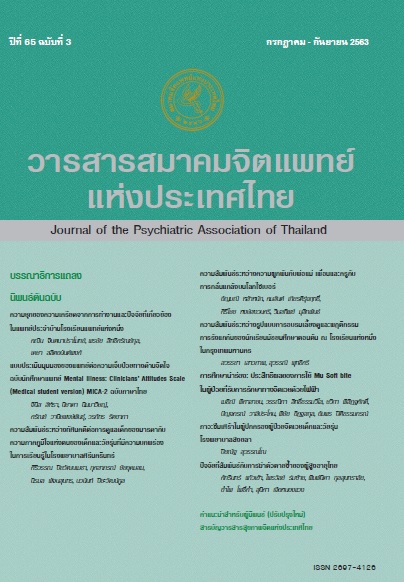Validity and Reliability of Mental Illness: Clinicians’ Attitudes Scale (Medical student version) MICA-2 Thai Version
Main Article Content
Abstract
Objective: To test the validity and reliability of Mental Illness: Clinicians’ Attitudes Scale (Medical student version) or MICA-2 Thai version
Methodology: MICA-2 was translated from English to Thai and was reviewed by experts for content validity using Index of Item-Objective Congruence (IOC). Back translation was performed and received approval from the copyright owner of the MICA-2. Internal consistency of MICA-2 Thai version was evaluated by calculating Cronbach’s alpha coefficient.
Results: 311 medical students completed the scale. The content validity of MICA-2 Thai version showed IOC mostly more than 0.5 (13 out of 16 items total). The Cronbach’s alpha coefficient for all scale was 0.614.
Conclusion: The Mental Illness: Clinicians’ Attitudes Scale (Medical student version) or MICA-2 Thai version has moderate validity and reliability. It is a promising assessment scale for the attiude of Thai medical students toward mental illness.
Article Details
Articles submitted for consideration must not have been previously published or accepted for publication in any other journal, and must not be under review by any other journal.
References
2. Parcesepe AM, Cabassa LJ. Public stigma of mental illness in the United States: a systematic literature review. Adm Policy Ment Health. 2013; 40(5):384-99.
3. Pescosolido BA. The public stigma of mental illness: what do we think; what do we know; what can we prove? J Health Soc Behav. 2013; 54(1):1-21.
4. Punyayong B. Kerdpongbunchote C. Review article: Stigma reduction strategies of mental illness. Journal of Mental Health of Thailand 2015; 23(1)
5. Choovanichvong S. Perception and attitude toward mental illness. Journal of Mental Health of Thailand 2010; 18(3).
6. Jones S, Howard L, Thornicroft G. Diagnostic overshadowing: worse physical health care for people with mental illness. Acta Psychiatr Scand 2008;118:169–173.
7. Stefanovics E, He H, Ofori-Atta A, Cavalcanti MT, Rocha Neto H, Makanjuola V, et al. Cross-National Analysis of Beliefs and Attitude Toward Mental Illness Among Medical Professionals From Five Countries. Psychiatr Q. 2016; 87(1):63-73.
8. Aruna G, Mittal S, Yadiyal MB, Acharya C, Acharya S, Uppulari C. Perception, knowledge, and attitude toward mental disorders and psychiatry among medical undergraduates in Karnataka: A cross-sectional study. Indian J Psychiatry 2016; 58:70-6.
9. Desai ND, Chavda PD. Attitudes of undergraduate medical students toward mental illnesses and psychiatry. J Educ Health Promot. 2018; 7:50.
10. Tomoo F, Manako H, Masanori K, Yuki K, Marshall E.C., Kameia H. An internet-based survey in Japan concerning social distance and stigmatization toward the mentally ill among doctors, nurses, pharmacists, and the general public. Asian Journal of Psychiatry 2018; 36: 1–7.
11. Lauber C, Anthony M, Ajdacic-Gross V,Rössler W. What about psychiatrists’ attitude to mentally ill people?. European Psychiatry 2004; 19: 423–27.
12. Rotenstein LS, Ramos MA, Torre M, Segal JB, Peluso MJ, Guille C et al. Prevalence of Depression, Depressive Symptoms, and Suicidal Ideation Among Medical Students A Systematic Review and Meta-Analysis. JAMA. 2016;316(21): 2214-36.
13. Eksteen HC, Becker PJ, Lippi G. Stigmatization towards the mentally ill: Perceptions of psychiatrists, pre-clinical and post-clinical rotation medical students. Int J Soc Psychiatry. 2017; 63(8): 782-91.
14. Simon N, Verdoux H. Impact of education program and clinical posting in psychiatry on medical students' stigmatizing attitudes towards psychiatry and psychiatric disorders. Encephale. 2018; 44(4): 329-336.
15. Deb T, Lempp H, Bakolis L, Vince T, Waugh W, Henderson C, and the INDIGO READ study group. Responding to experienced and anticipated discrimination (READ): anti -stigma training for medical students towards patients with mental illness – study protocol for an international multisite non-randomised controlled study. BMC Med Educ. 2019; 19: 41.
16. Kassam A, Glozier N, Leese M, Henderson C, Thornicroft G. Development and responsiveness of a scale to measure clinicians’ attitudes to people with mental illness (medical student version). Acta Psychiatr Scand 2010; 122:153–61.
17. Taylor SM, Dear MJ. Scaling community attitudes toward the mentally ill. Schizophr Bull. 1981; 7(2):225-40.
18. Link B, Cullen F, Frank J, Wozniak J. The social rejection of former mental patients Understanding why label matter. Am Sociol Rev. 1987; 54: 100–23.
19. Tanaka G. Development of the mental illness and disorder understanding scale. Int J Jpn Sociol 2003;12:95–107.
20. Yanos PT, Vayshenker B, Joseph S. DeLuca JS, Lauren K. O’Connor LK. Development and Validation of a Scale Assessing Mental Health Clinicians’ Experiences of Associative Stigma. Psychiatr Serv. 2017; 68(10): 1053-60.
21. Amornmahaphun S, Jiranukool J, Summart U. Effectiveness of Auditory Hallucination Audio Media on Medical Students’ Attitudes towards Psychiatric Patient and Mental Illness. J Psychiatr Assoc Thailand 2017; 62(2): 149-56.


